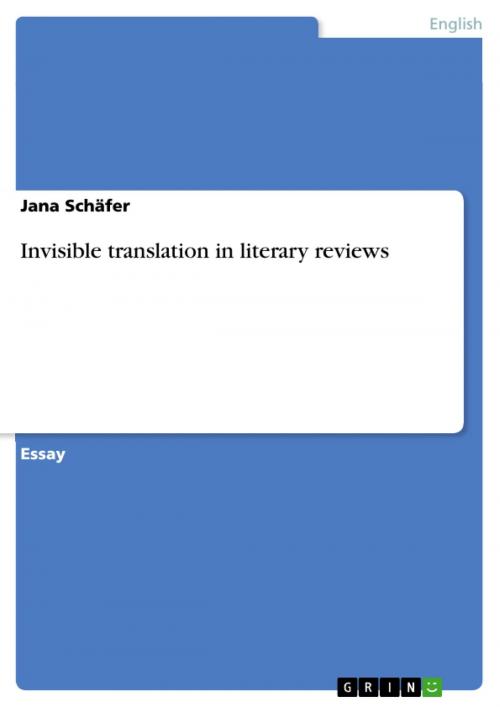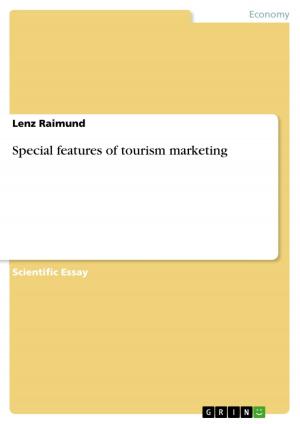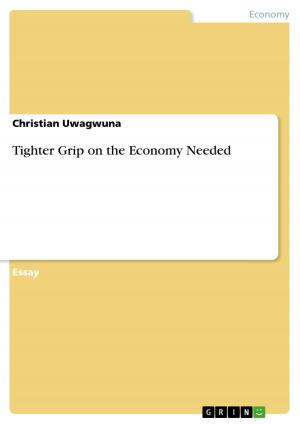| Author: | Jana Schäfer | ISBN: | 9783668161320 |
| Publisher: | GRIN Publishing | Publication: | February 25, 2016 |
| Imprint: | GRIN Publishing | Language: | English |
| Author: | Jana Schäfer |
| ISBN: | 9783668161320 |
| Publisher: | GRIN Publishing |
| Publication: | February 25, 2016 |
| Imprint: | GRIN Publishing |
| Language: | English |
Essay from the year 2015 in the subject English Language and Literature Studies - Linguistics, grade: 2,0, University College Dublin, course: Translation Theory, language: English, abstract: Translation of literary texts suffer always an ungrateful position in academic and cultural discourse. Generally, there are only two ways of treatment: no acknowledgment at all or criticism about the unfaithfulness. One can decide which way he prefers but translators todays are mostly praised for their invisibility and not for their actual work. This is especially the case in book reviews where the focus is on the meaning, thus the content of the book, instead on the translator's work. Already in 1994 Lawrence Venuti wrote his influential essay about The Translator's Invisibility concerning the focus on fluency in translation instead of a foreignization. Here, book reviews show exactly this trend. Nevertheless, the fact of being from another culture comes into account in their attempt of settling the book into their own culture. Linked to that is André Lefevere's theory of literature as a system which he depicts in his essay Mother Courage's Cucumbers: Text, System and Refraction in a Theory of Literature (1982). In my essay I would like to show how both Lefevere's and Venuti's concepts and criticism are internalised in contemporary book reviews and therefore in our (literary) culture in general. Concerning that, I will shortly present the theoretical background of Venuti and Lefevere with their most interesting points for literary criticism. Followed by that is the case study where I analyse three different literary reviews and finish with a contemporary translator dispute in newspapers. Thus, the invisibility of the translator as well as the disappearance of the source culture will be highlighted.
Essay from the year 2015 in the subject English Language and Literature Studies - Linguistics, grade: 2,0, University College Dublin, course: Translation Theory, language: English, abstract: Translation of literary texts suffer always an ungrateful position in academic and cultural discourse. Generally, there are only two ways of treatment: no acknowledgment at all or criticism about the unfaithfulness. One can decide which way he prefers but translators todays are mostly praised for their invisibility and not for their actual work. This is especially the case in book reviews where the focus is on the meaning, thus the content of the book, instead on the translator's work. Already in 1994 Lawrence Venuti wrote his influential essay about The Translator's Invisibility concerning the focus on fluency in translation instead of a foreignization. Here, book reviews show exactly this trend. Nevertheless, the fact of being from another culture comes into account in their attempt of settling the book into their own culture. Linked to that is André Lefevere's theory of literature as a system which he depicts in his essay Mother Courage's Cucumbers: Text, System and Refraction in a Theory of Literature (1982). In my essay I would like to show how both Lefevere's and Venuti's concepts and criticism are internalised in contemporary book reviews and therefore in our (literary) culture in general. Concerning that, I will shortly present the theoretical background of Venuti and Lefevere with their most interesting points for literary criticism. Followed by that is the case study where I analyse three different literary reviews and finish with a contemporary translator dispute in newspapers. Thus, the invisibility of the translator as well as the disappearance of the source culture will be highlighted.















